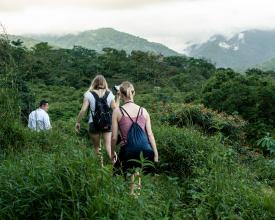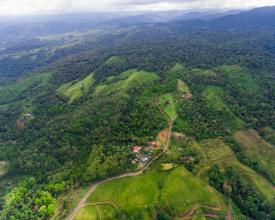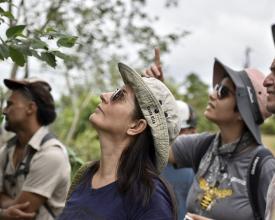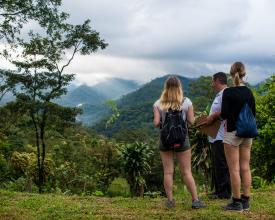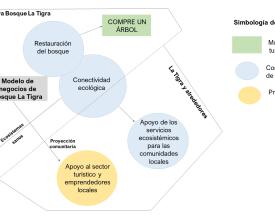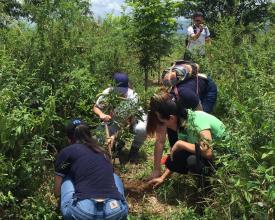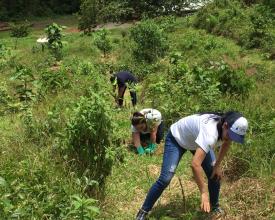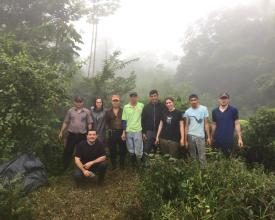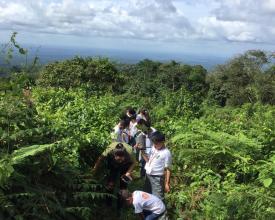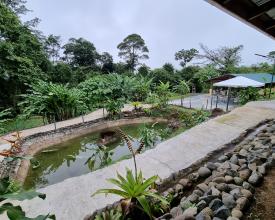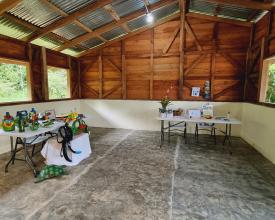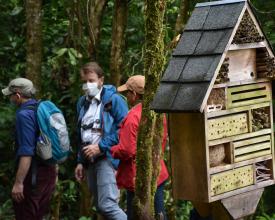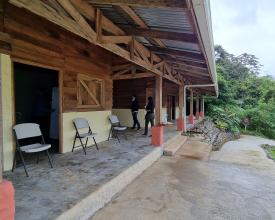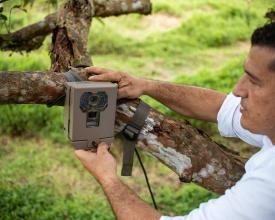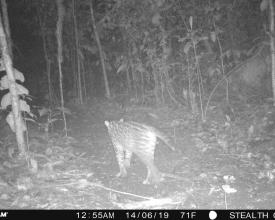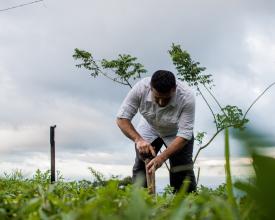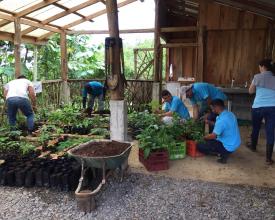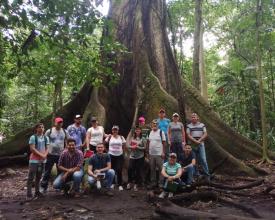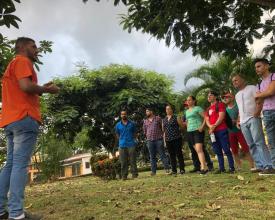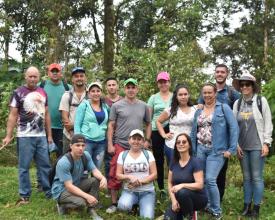
Réserve Bosque La Tigra : Un modèle reproductible d'écotourisme durable et communautaire
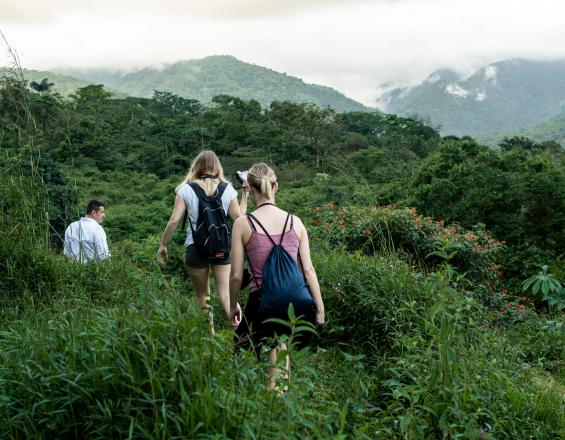
Reserva Bosque La Tigra : Biodiversity in action Costa Rica vise à développer un modèle reproductible d'écotourisme durable et communautaire, qui comprend la création de la station/réserve biologique Bosque La Tigra pour la protection et l'utilisation durable de la biodiversité, ainsi que des efforts de reforestation, la fixation du carbone, la protection des sources d'eau potable, l'éducation à l'environnement, la surveillance de la biodiversité et le développement de services d'écotourisme. Bosque La Tigra se concentre également sur la sensibilisation des communautés, en facilitant le renforcement des capacités et le développement des compétences dans le domaine du tourisme pour les communautés locales.
Le projet est une initiative de la société Travel to Nature et du programme develoPPP, mis en œuvre par la Coopération allemande pour le développement, GIZ, au nom du ministère fédéral de la Coopération économique et du Développement (BMZ).
Contexte
Défis à relever
Le district de La Tigra et ses environs, situé dans la province d'Alajuela, a développé une culture intensive de plantes ornementales dans les années 90, comme principale activité économique, qui a progressivement disparu et a laissé cette région avec peu d'opportunités économiques et d'emplois. De plus, l'augmentation de la chasse illégale d'espèces et la déforestation ont causé des dommages importants aux écosystèmes et à la faune locale.
La Tigra et ses environs sont situés à proximité de zones protégées nationales et privées. La biodiversité est l'un des principaux attraits de cette région, qui recèle un immense potentiel touristique qui n'a pas été exploité.
Bosque La Tigra vise à devenir un produit touristique innovant qui se distingue par son sens élevé de la responsabilité vis-à-vis de la biodiversité locale. Le projet vise également à réactiver et à dynamiser les activités touristiques dans cette région, à encourager les chaînes de production de services touristiques et à créer de nouvelles opportunités pour les communautés locales de La Tigra et des districts voisins.
Emplacement
Traiter
Résumé du processus
Grâce à son modèle d'entreprise durable, Bosque La Tigra s'est engagé à mettre en œuvre des stratégies commerciales respectueuses de la biodiversité et à faire un usage durable de la biodiversité pour son offre touristique et à contribuer à sa conservation, toutes ces mesures visant à garantir la continuité de son activité à long terme. Les éléments constitutifs interagissent à partir de cette logique : Bosque La Tigra contribue à la conservation de la biodiversité en restaurant la forêt et en améliorant la connectivité écologique. Par conséquent, des écosystèmes sains permettent la création et la conception de nombreux produits d'écotourisme et d'activités d'éducation à l'environnement qui sont à la base du modèle d'entreprise de Bosque La Tigra. En outre, la conservation des forêts permet un flux sain de services écosystémiques qui apportent des avantages aux communautés proches du projet, tels que l'eau potable, l'air pur, la régulation du climat et un écosystème diversifié. Le modèle global est complété par le programme de sensibilisation des communautés que Bosque La Tigra promeut, en apportant des avantages aux communautés proches du projet, notamment le développement des capacités dans le secteur du tourisme, qui à son tour dynamise l'économie de La Tigra et de ses environs et contribue au développement local.
Blocs de construction
Restauration des forêts et connectivité écologique
Bosque La Tigra possède 46 hectares de forêts primaires et secondaires, ainsi que des zones de régénération, vestiges d'anciennes plantations de fruits de la passion. Bosque La Tigra jouxte la Children Eternal Rainforest, la plus grande réserve privée du Costa Rica, avec 23 000 hectares. Pour le projet, cet emplacement est un élément stratégique du travail de la réserve.
Bosque La Tigra a pour objectif de favoriser la connectivité écologique des deux réserves en conservant la forêt et en restaurant activement les zones de régénération de la réserve avec des arbres indigènes. À cette fin, le projet a conçu une séquence de reboisement pour les zones de régénération, ce qui permettra à la zone d'entrer dans un processus de succession écologique et de favoriser la connectivité écologique avec la forêt tropicale éternelle des enfants.
Au moins 40 espèces différentes d'arbres et de buissons indigènes ont été identifiées pour être plantées dans les zones de régénération. Le projet a mis en place une pépinière qui reproduit des arbres et des semis provenant des mêmes forêts primaires et secondaires de la réserve et qui a une capacité de 700 semis et plantes.
Entre 2017 et 2020, un total de 4500 arbres ont été plantés. Chaque effort de reforestation est soutenu par le travail bénévole des étudiants, des employés des entreprises, des touristes nationaux et internationaux et du personnel de Bosque La Tigra.
Facteurs favorables
- La présence de forêts primaires et secondaires abritant une flore indigène, dont les graines peuvent être reproduites, fournit du matériel génétique pour les activités de reboisement de Bosque La Tigra.
- La proximité d'une zone protégée telle que la Children Eternal Rainforest favorise le déplacement de la faune locale vers Bosque La Tigra.
- L'engagement privé, représenté par Travel to Nature, dont le modèle d'entreprise repose sur la régénération, opère dans les limites de la nature et est conçu pour travailler avec elle et la soutenir.
Leçon apprise
- L'ancrage de la restauration forestière dans le modèle d'entreprise de Bosque La Tigra est un élément clé, car les arbres sont vendus aux entreprises, aux touristes et aux visiteurs, et les revenus sont utilisés pour couvrir les coûts associés à l'achat de la propriété et à l'acquisition de nouvelles propriétés autour de la propriété d'origine. En ce sens, les entreprises paient pour compenser leur performance par la reforestation et la fixation du carbone, et Bosque La Tigra restaure les forêts dans le cadre de son offre de responsabilité environnementale aux entreprises. De cette manière, les entreprises internationales parrainent des lots de plantation allant jusqu'à 500 arbres et les rendent visibles dans le cadre de leurs stratégies environnementales.
Ressources
Éducation à l'environnement : École de la forêt tropicale de Bosque La Tigra
Bosque La Tigra a construit une station biologique dans la réserve qui sert d'école de la forêt tropicale, un lieu d'apprentissage et de découverte de la forêt. Les étudiants, les familles de touristes et les visiteurs peuvent vivre une expérience de première main à Bosque La Tigra et profiter des activités de plein air dans la réserve.
Les familles peuvent visiter Bosque La Tigra et vivre une expérience unique au cœur de la forêt tropicale. Bosque La Tigra est également un espace accueillant pour les écoles et les lycées de La Tigra et des environs, où les élèves peuvent apprendre à connaître la forêt tropicale, sa dynamique et la biodiversité locale. La station biologique de Bosque La Tigra dispose de salles de classe pour dispenser des cours aux communautés locales qui suivent une formation en matière d'orientation touristique et d'entrepreneuriat, entre autres.
Bosque La Tigra s'est attaché à créer des alliances avec des universités, des écoles et des instituts d'apprentissage pour coopérer et mettre en œuvre des programmes d'éducation à l'environnement et d'autres formations à la station biologique. Le projet offre également un hébergement pour des groupes d'étudiants afin de développer des cours et des formations en plein air.
Facteurs favorables
- Bosque La Tigra a exploité l'avantage d'avoir une salle de classe unique juste à l'extérieur de la station biologique : la forêt tropicale. Il s'agit d'une caractéristique essentielle de la réserve, qui la rend attrayante pour les visiteurs et les groupes d'étudiants.
Leçon apprise
En raison de la pandémie de Covid-19, Bosque La Tigra a adapté les hébergements pour la nuit afin de loger des groupes plus petits. À l'origine, ils étaient conçus pour accueillir de grands groupes, mais après les recommandations de distanciation sociale, cet aspect a été revu. Aujourd'hui, Bosque La Tigra peut héberger de petits groupes d'étudiants, de visiteurs, de familles et de bulles sociales.
Offre touristique responsable en matière de biodiversité
Bosque La Tigra a développé un produit touristique attrayant pour les visiteurs internationaux et nationaux, les communautés et les étudiants qui aspirent à se connecter avec la nature et à apprendre de la biodiversité locale. Ce produit touristique se distinguera par une offre créée avec un sens élevé de la responsabilité environnementale et servira d'exemple, d'inspiration, de vitrine et de modèle reproductible pour les organisations internationales et nationales.
Le Bosque La Tigra propose des visites guidées, un sentier de randonnée interactif où les visiteurs peuvent en apprendre davantage sur la forêt tropicale, la biodiversité locale et la faune. Les visiteurs peuvent parcourir 4 km de sentiers à travers les forêts primaires et secondaires. Les sentiers sont interprétés par des panneaux indiquant les espèces d'arbres les plus représentatives des forêts, avec des informations telles que le nom scientifique, le nom commun, l'histoire naturelle ou une brève description de l'espèce. Les visiteurs peuvent également visiter la pépinière et choisir un arbre indigène à planter dans la réserve. La réserve mène également des activités de surveillance de la faune, en installant des pièges à caméra qui enregistrent des vidéos et des photographies de la faune qui vit dans la réserve. Les visiteurs peuvent également voir l'installation des caméras et observer des vidéos et des photos de la faune locale.
Facteurs favorables
- La proximité des forêts protégées et de celles qu'il protège fait de Bosque La Tigra un endroit idéal pour développer une offre touristique qui tire parti d'écosystèmes sains et travaille dans leurs limites, en garantissant une utilisation durable et la conservation de la biodiversité.
- L'engagement de Travel to Nature dans l'écotourisme durable et sa vision de concevoir une offre touristique qui combine des expériences de voyage exclusives avec la durabilité sont des aspects clés pour mettre en œuvre ce type de modèle d'entreprise.
Leçon apprise
- Les tendances touristiques mondiales montrent un besoin croissant d'offres et de voyages durables. En ce sens, Bosque La Tigra parvient à répondre aux besoins de ce segment et à saisir les opportunités que ces tendances offrent à l'écotourisme.
Ressources
Sensibilisation des communautés et développement des capacités pour le tourisme
Bosque La Tigra a une vision claire de l'engagement communautaire pour son activité : l'écotourisme à La Tigra et dans les environs ne peut prospérer que si toutes les personnes impliquées dans le secteur du tourisme ont les capacités et les compétences nécessaires pour exercer cette activité ; par conséquent, le projet a identifié les besoins de formation pour améliorer les compétences touristiques des communautés locales et des entrepreneurs.
- Le projet a soutenu la formation de 14 personnes des communautés locales pour qu'elles deviennent des guides touristiques officiels entre 2018 et 2021. Ils ont reçu des cours sur les généralités du tourisme et l'éthique du tourisme, l'attention et l'orientation des touristes, la géographie et le tourisme culturel du Costa Rica, et l'histoire naturelle. Ces futurs guides touristiques ont accompli 70 % du programme d'études.
- Le projet a développé une formation en compétences entrepreneuriales pour les entreprises écotouristiques de La Tigra et des districts voisins. En 2021, 15 entrepreneurs ont reçu une formation ludique et participative pour développer leurs compétences commerciales, sur des sujets tels que le profil de l'entrepreneur, le concept d'entreprise, la marque et l'image, le marketing, le marketing numérique, les coûts et la formalisation de l'entreprise. La formation a consisté en des sessions de groupe et un mentorat individuel pour chaque participant. Grâce à la formation, les entrepreneurs ont augmenté la fréquentation de leur établissement et les achats de leurs produits.
Facteurs favorables
- Les bonnes relations qu'entretient Bosque La Tigra avec les communautés locales ont contribué à faciliter la coordination et le suivi des activités.
- Les communautés locales sont très intéressées et engagées dans l'apprentissage et l'application de nouvelles compétences à leur activité touristique.
Leçon apprise
- Le renforcement des capacités et la formation, en particulier dans le secteur du tourisme, ont un grand potentiel d'autonomisation des personnes et, dans ce cas, des entrepreneurs. Les participants ont fait preuve d'un grand enthousiasme et d'un engagement sans faille à l'égard de la formation. Actuellement, les entrepreneurs appliquent les connaissances acquises à leurs produits et services touristiques, avec des résultats positifs.
Impacts
Cette initiative globale a permis des interventions réussies dans de nombreux domaines tels que la restauration de la forêt tropicale, l'amélioration de la connectivité écologique, l'éducation à l'environnement, le renforcement des capacités des communautés locales, ainsi que la revitalisation et le rétablissement du secteur touristique local.
Bosque La Tigra a réussi à développer un produit touristique attrayant pour les visiteurs internationaux et nationaux, les communautés et les étudiants qui aspirent à se connecter avec la nature et à apprendre de la biodiversité locale. Ce produit touristique sert d'exemple, d'inspiration, de vitrine et de modèle reproductible pour les organisations internationales et nationales.
Le projet a permis de mettre en œuvre un modèle commercial qui fonctionne dans les limites de la nature et qui est conçu pour travailler avec la nature et la soutenir. Au cours de la mise en œuvre du projet, plus de 4 000 arbres indigènes ont été plantés dans la réserve. Au total, 46 hectares de forêt tropicale secondaire et primaire peuvent désormais prospérer et se développer sous l'égide de Bosque La Tigra. Les sources d'eau qui fournissent de l'eau potable à plus de 1000 personnes à La Tigra sont maintenant protégées.
Le projet a eu des répercussions bien au-delà des limites de Bosque La Tigra. Actuellement, un groupe de propriétaires d'entreprises, d'entrepreneurs et de différentes parties prenantes du district de La Tigra et d'autres districts environnants se sont engagés dans un processus stratégique visant à créer de nouvelles destinations touristiques dans la région.
Bénéficiaires
- Environs du Bosque La Tigra : communautés locales de San Lorenzo et Peñas Blancas, San Ramón ; et La Tigra, San Carlos.
- Les écoles de La Tigra.
- La biodiversité locale de la forêt tropicale humide du Bosque La Tigra.
Objectifs de développement durable
Histoire
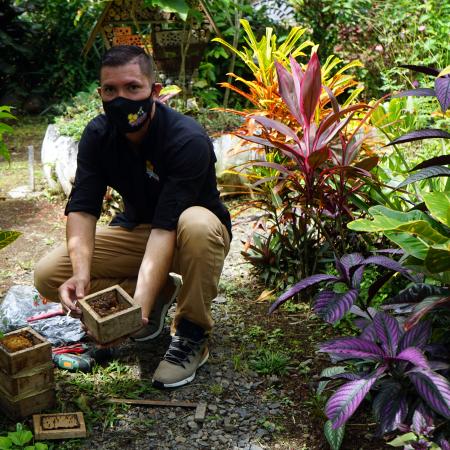
Les districts de San Lorenzo, La Tigra et Peñas Blancas sont traversés par la route nationale 702, une route très fréquentée pour sa destination finale : le volcan Arenal et La Fortuna, l'un des centres touristiques les plus développés du Costa Rica. Cependant, les quartiers situés le long de la route 702 recèlent un immense potentiel touristique, une grande biodiversité et des attractions touristiques de grand intérêt. De même, il existe un groupe d'hommes d'affaires et d'entrepreneurs touristiques qui développent leurs activités le long de cette route nationale à la recherche d'un meilleur revenu familial et d'un développement personnel.
Bosque La Tigra a identifié le potentiel touristique de cette zone et a encouragé le développement de compétences dans le secteur du tourisme. Dans un premier temps, avec le soutien de la GIZ, 14 personnes issues des communautés ont été formées en tant que guides touristiques locaux et 15 personnes ont amélioré leurs compétences en gestion afin de les appliquer dans leurs entreprises.
Dans un deuxième temps, Bosque La Tigra a encouragé l'organisation locale pour une meilleure gestion de la destination touristique. Actuellement, un groupe de 30 hommes d'affaires et entrepreneurs touristiques est organisé pour prendre des décisions au niveau d'une nouvelle destination touristique : Destino Ecoturístico Ruta 702, en prenant des décisions stratégiques pour développer la destination dans le cadre d'une vision commune. Ils ont également formé une communauté pour l'échange d'expériences de bonnes pratiques touristiques et de conseils et recommandations de leurs pairs à appliquer dans leurs entreprises. L'organisation encourage également l'établissement de liens productifs entre les entreprises.
Selon José Miguel Herrera, président de l'association d'écotourisme Route 702, entrepreneur et apiculteur, "nous nous sommes organisés pour aller de l'avant en tant qu'entrepreneurs touristiques, en développant le potentiel de nos beaux quartiers et en nous soutenant mutuellement. Nous sommes conscients de la précieuse biodiversité de notre destination touristique et nous voulons en tirer le meilleur parti, tout en l'utilisant de manière durable et en garantissant sa conservation".

